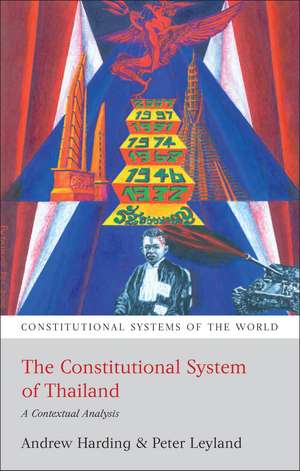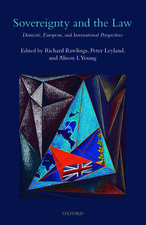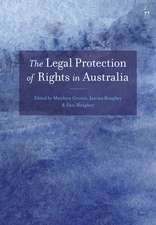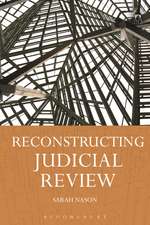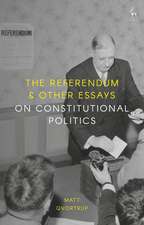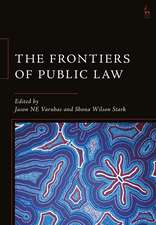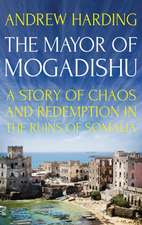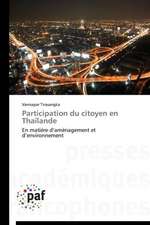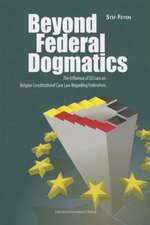The Constitutional System of Thailand: A Contextual Analysis: Constitutional Systems of the World
Autor Andrew Harding, Peter Leylanden Limba Engleză Paperback – 27 apr 2011
Din seria Constitutional Systems of the World
- 28%
 Preț: 374.41 lei
Preț: 374.41 lei - 38%
 Preț: 134.64 lei
Preț: 134.64 lei - 22%
 Preț: 263.72 lei
Preț: 263.72 lei - 19%
 Preț: 166.82 lei
Preț: 166.82 lei - 28%
 Preț: 466.81 lei
Preț: 466.81 lei - 13%
 Preț: 174.07 lei
Preț: 174.07 lei - 30%
 Preț: 509.52 lei
Preț: 509.52 lei - 23%
 Preț: 152.82 lei
Preț: 152.82 lei - 14%
 Preț: 147.59 lei
Preț: 147.59 lei - 23%
 Preț: 185.93 lei
Preț: 185.93 lei - 21%
 Preț: 218.26 lei
Preț: 218.26 lei - 23%
 Preț: 178.47 lei
Preț: 178.47 lei - 19%
 Preț: 303.62 lei
Preț: 303.62 lei - 18%
 Preț: 300.14 lei
Preț: 300.14 lei - 30%
 Preț: 510.03 lei
Preț: 510.03 lei - 18%
 Preț: 304.66 lei
Preț: 304.66 lei - 23%
 Preț: 178.02 lei
Preț: 178.02 lei - 18%
 Preț: 225.31 lei
Preț: 225.31 lei - 23%
 Preț: 197.14 lei
Preț: 197.14 lei - 18%
 Preț: 180.44 lei
Preț: 180.44 lei - 18%
 Preț: 179.98 lei
Preț: 179.98 lei - 18%
 Preț: 186.35 lei
Preț: 186.35 lei -
 Preț: 306.56 lei
Preț: 306.56 lei - 14%
 Preț: 179.00 lei
Preț: 179.00 lei - 16%
 Preț: 218.47 lei
Preț: 218.47 lei - 19%
 Preț: 184.14 lei
Preț: 184.14 lei - 18%
 Preț: 297.58 lei
Preț: 297.58 lei - 16%
 Preț: 218.00 lei
Preț: 218.00 lei - 18%
 Preț: 232.54 lei
Preț: 232.54 lei - 23%
 Preț: 171.85 lei
Preț: 171.85 lei - 18%
 Preț: 225.49 lei
Preț: 225.49 lei - 14%
 Preț: 185.93 lei
Preț: 185.93 lei - 13%
 Preț: 230.79 lei
Preț: 230.79 lei - 13%
 Preț: 186.10 lei
Preț: 186.10 lei - 19%
 Preț: 179.10 lei
Preț: 179.10 lei -
 Preț: 223.20 lei
Preț: 223.20 lei - 18%
 Preț: 180.44 lei
Preț: 180.44 lei -
 Preț: 217.09 lei
Preț: 217.09 lei - 18%
 Preț: 186.35 lei
Preț: 186.35 lei
Preț: 192.30 lei
Preț vechi: 222.56 lei
-14% Nou
Puncte Express: 288
Preț estimativ în valută:
36.81€ • 37.93$ • 31.07£
36.81€ • 37.93$ • 31.07£
Carte tipărită la comandă
Livrare economică 04-18 martie
Preluare comenzi: 021 569.72.76
Specificații
ISBN-13: 9781841139722
ISBN-10: 1841139726
Pagini: 274
Dimensiuni: 138 x 216 x 14 mm
Greutate: 0.39 kg
Ediția:New.
Editura: Bloomsbury Publishing
Colecția Hart Publishing
Seria Constitutional Systems of the World
Locul publicării:London, United Kingdom
ISBN-10: 1841139726
Pagini: 274
Dimensiuni: 138 x 216 x 14 mm
Greutate: 0.39 kg
Ediția:New.
Editura: Bloomsbury Publishing
Colecția Hart Publishing
Seria Constitutional Systems of the World
Locul publicării:London, United Kingdom
Caracteristici
A critical discussion of the institutional frameworks which have been established under recent constitutions in Thaliand.Individual chapters deal with the monarchy, elections and parliament, the civil service and the executive organs of the state, the contracting and regulatory state, local government, Thailand's constitutional watchdog bodies and the constitutional role of the courts.Assesses the numerous attempts to establish a modern system of democratic government in Thailand against the background of Thai politics and culture.Written in an accessible style which would suit those new to the subject.
Notă biografică
Andrew Harding is Professor of Asia-Pacific Law at the University of Victoria, British Columbia, Canada.Peter Leyland is Professor of Public Law at London Metropolitan University.
Cuprins
1 Historical Analysis and Contemporary Iss ues in Thai Constitutionalism 2 The Na tional Assembly, Elections and the Political Proces 3 The Executive Branch of Government 4 Local Democracy, Southern Insurgency and Territorial Division of Power in Thailand 5 The Constitutional Court AND CONSTITUTIONAL REVIEW6 Administrative Justice 7 Human Rights 8 Conclusion: Reflections on the Thai Constitutional Landscape
Recenzii
Authors Professor Andrew Harding and Professor Peter Leyland have made a good attempt to comprehensively describe and critique the constitutional system of the Kingdom of Thailand and this is a unique contribution to introductory resources on Thai constitutionalism in the English language.The series itself makes an impressive contribution to comparative constitutional law scholarship, and this volume assists the English reader unable to read primary legal material in Thai to access a useful introduction to the history and contemporary functioning of Thai constitutionalism. ...a unique, readable and well-referenced introduction, and is highly valuable for the novice scholar of Thai constitutional law and the experienced specialist alike.
With eighteen different constitutions, in the space of eighty years, writing a book about the constitutional system of Thailand is a daunting task. This volume rises to the challenge effectively, providing a comprehensive analysis of Thailand's governing system, including both specific constitutional provisions and the broader parliamentary, administrative and judicial context. Legal discussion is nicely integrated with even-handed political analysis. This is an invaluable resource for scholars of Thai politics, administration and law. There is plenty of constitutional detail and comparison of different approaches in various charters, but not so much that the reader is swamped. Detailed tables of legal cases, statutes, constitutional sections, treaties and decrees at the beginning of the book enhance its accessibility and usefulness as a reference volume.
Andrew Harding and Peter Leyland must be applauded for having delivered an easily accessible, balanced and comprehensive account of the Thai constitutional system - a first in English.This is an ambitious study, striding confidently across the varying fields of history, politics and legal scholarship. Given the considerable country expertise of the two authors, their careful referencing, and their suggestions for further readings (in Thai and English) at the end of each chapter, this book leaves little for readers to wish for, particularly those readers seeking an accessible introduction to a complex subject.The book should also offer useful insights for a wider audience not otherwise drawn by the title of the book because the authors have a broad concept of constitutionalism that embraces such related topics as civil service reform, party systems, and corruption concerns.Given it is both stylistic in manner and comprehensive in approach, it should be essential reading for those seeking to understand a constitutional context that has bewildered observers for decades. In effect, it gives readers the information they need to form their own opinions, which so few scholarly works readily achieve.
With eighteen different constitutions, in the space of eighty years, writing a book about the constitutional system of Thailand is a daunting task. This volume rises to the challenge effectively, providing a comprehensive analysis of Thailand's governing system, including both specific constitutional provisions and the broader parliamentary, administrative and judicial context. Legal discussion is nicely integrated with even-handed political analysis. This is an invaluable resource for scholars of Thai politics, administration and law. There is plenty of constitutional detail and comparison of different approaches in various charters, but not so much that the reader is swamped. Detailed tables of legal cases, statutes, constitutional sections, treaties and decrees at the beginning of the book enhance its accessibility and usefulness as a reference volume.
Andrew Harding and Peter Leyland must be applauded for having delivered an easily accessible, balanced and comprehensive account of the Thai constitutional system - a first in English.This is an ambitious study, striding confidently across the varying fields of history, politics and legal scholarship. Given the considerable country expertise of the two authors, their careful referencing, and their suggestions for further readings (in Thai and English) at the end of each chapter, this book leaves little for readers to wish for, particularly those readers seeking an accessible introduction to a complex subject.The book should also offer useful insights for a wider audience not otherwise drawn by the title of the book because the authors have a broad concept of constitutionalism that embraces such related topics as civil service reform, party systems, and corruption concerns.Given it is both stylistic in manner and comprehensive in approach, it should be essential reading for those seeking to understand a constitutional context that has bewildered observers for decades. In effect, it gives readers the information they need to form their own opinions, which so few scholarly works readily achieve.
Descriere
The book assesses the attempts to establish a modern system of democratic government in Thailand against the background of Thai politics and culture.
